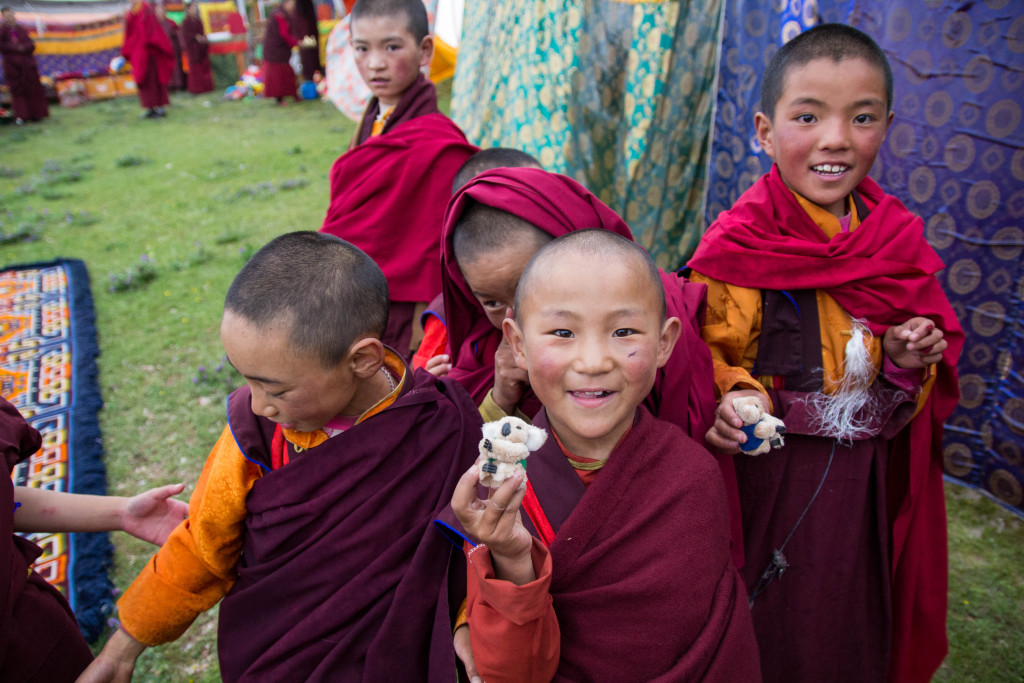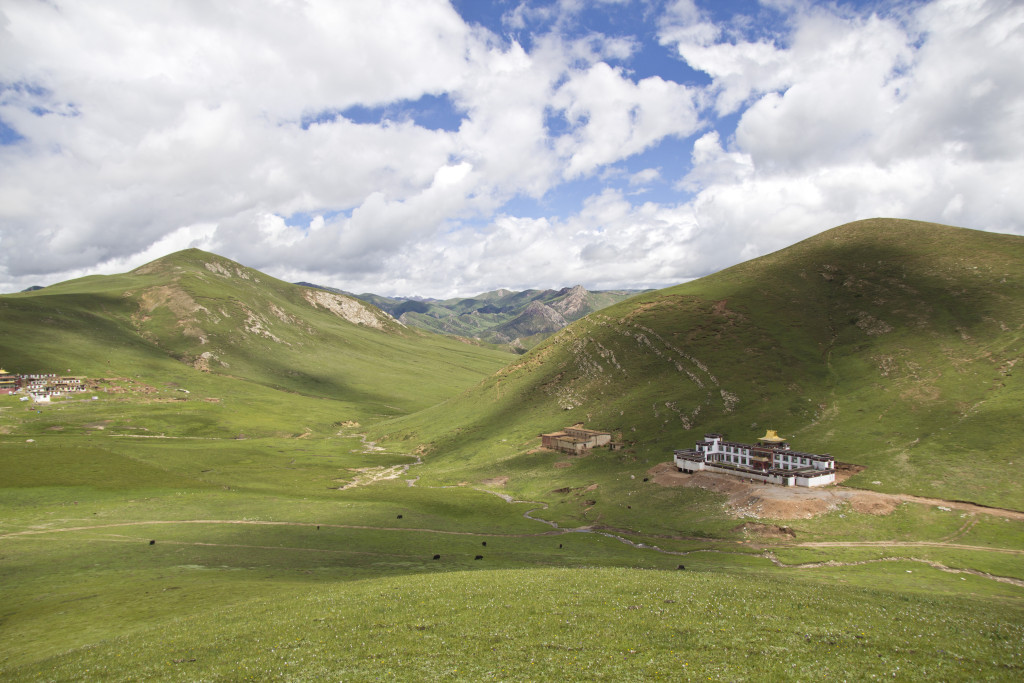They were girls, but they acted like boys. With their crimson and saffron-coloured robes, and their heads bare of a single thread of hair, it was often hard to tell the difference. They fought like boys. When they grappled over the photos on my iPhone they were flying elbows and crouching knees, just like boys. When they carried water from the river on their backs, they paused to flex their tiny muscles, just like boys. And when they sat on my lap – their shaven heads prickling my chin, their palms clasped firmly against mine, their pubescent voices cracking in the wind – their little bodies were hard and strong. Just like boys.
She was like a boy, but she was a girl. I met her on a pilgrimage to the high plateau, in a nunnery deep in the wilderness of Tibet. Amongst the other fourteen little nuns, she didn’t seem out of the ordinary. Until one day she sat next to me and, holding the toy koala I had given her the day before, clipped it to her nose.
What does it take to fall in love with another? A recognition of spirit? A similarity of soul?
I liked her because of her patience; because she was able to get lost in her imagination, while still happily playing with her toys; because she looked like a boy; because she was very serious when she wanted to be; because she could do cartwheels; because when I tickled her she giggled non-stop; because I liked her husky little voice that belonged to the body of neither boy nor girl, but a prepubescent mix of both. Or maybe it was just because she liked my koala. Whatever it was, she followed me everywhere that afternoon, and by the end of the day, I was in love.
*
They called her my little sister but I thought of her as my daughter. I loved her precisely because it was antithetical to love her: a child in the middle of the Tibetan wilderness, with no parents present to speak of. People have loved for less.
‘You fell into propinquity or distance,’ says the English patient Almásy to his lover Katharine Clifton, in the novel of the same name by the Canadian author Michael Ondaatje. ‘Relationships fell into patterns.’
I knew my patterns. I knew I loved her because I was fascinated by her ignorance; because she was sensitive, and I liked that in another person; because I couldn’t understand her; because she was a child; because she resembled me in some way; and because at the end of it all she would never be mine, but in spite of – or perhaps because of – all these patterns, I chose to ignore them and loved her anyway.
There were others I could have loved. One nun, with two little yellow front teeth shaped like buds of corn, grabbed my camera the moment she saw it and began taking decently composed photos with it right away. Another little nun loved to hold people’s hands, and hugged everything, even if it was the lame dog with weeping eyes that lived beneath her house. And a third, who was considered the self-selected ring leader of the little nuns, could not only sing confidently to a crowd of attentive pilgrims, but also carried herself with a sense of ease that suggested she had visited this earth more than just a few times. The whispers around the nunnery were that she was a reincarnation of a high lama. If there was any nun to single out, it would have been her.
Were they nuns or were they girls? This thought struck me often when they fawned over my nails, or played with my cropped hair. Or when they sat in the prayer hall, glancing up at me making faces at them from the upper balcony. Sometimes I thought I was in another world completely. Once, stepping out of the tent after a long day of festivities, I was greeted by the sight of fourteen little nuns squatting, one after the other – a reverse Tibetan wave – only to realize that they were not-so-discreetly going to the toilet.
I taught her English. I reasoned that if there were people who came to visit in the future, it was highly unlikely they would be English-speaking, and perhaps this was the only opportunity she would ever have to be exposed to the Western world. With her tiny hands mirroring mine, I came up with ways of illustrating words that I hoped she would remember. ‘Kangaroo’ involved two hands held together, curved over, like paws. ‘Thank you’ was a slight bow of the head, followed by a thumbs up. ‘Goodbye’ was the requisite wave. ‘Australia’ was two palms opening up to a world that was as big as China, but, as I tried to suggest with my expansive movements, with skies as big as the ocean and beaches as white as clouds.
‘Ausdralia!’ she repeated after me, and ‘I rove you!’ If she remembered nothing, I hoped she would at least remember those words.
When I got bored of chanting, I would hold her in my lap and look at her face and body. Her eyes, which I initially thought looked Korean, were set wide apart. Her nose was flat and spread when she smiled. I loved her eyelashes that curled at the ends like insect feet, and her ears that stuck out like little alien wings from the side of her head. Her body was boyish and thin. Her skin was not at all soft. We looked and behaved nothing alike, but there was something in her that told me we were somehow bonded.
And when she grabbed my hand and led me to the dinner hall, I knew without a doubt that she was all mine.
*
In his teachings, the 14th Dalai Lama, the head of the Tibetan Buddhist faith, has spoken at length about love and attachment of others. ‘Many forms of compassionate feeling are mixed with desire and attachment,’ he has said. ‘For instance, the love parents feel of their child is often strongly associated with their own emotional needs, so it is not fully compassionate. […] True compassion is not just an emotional response but a firm commitment founded on reason.’
And yet, in the isolation of the Tibetan plateau, I fantasized about taking my little nun home to play on beaches of crumbly white and umber sand, of shucking her into her first bathing suit, of watching her eyes start at the shock of cold ice cream, of drying her salt-sprayed face, and of sitting with her on the jetty as the sun went down and dissolved the lingering ring of orange sky.
But perhaps the biggest sign that she didn’t belong to me occurred early on, when I wasn’t paying so much attention. One morning, I decided to go for a walk. When the celebrations for the festival my group and I had supposedly arrived to attend weren’t on at the nunnery, there wasn’t a lot to do — climbing up the hills in the surrounding valley therefore became a daily event. That day, I had been looking for my little nun, but as I couldn’t find her, I set off for the valley with a friend.
We hadn’t been walking long when my little nun found me. There she was, in a sleeveless yellow shirt, coming out from the nuns’ quarters. On her head was a little trapezoidal shade that nuns and monks wore to protect them from the sun, and around her waist was her crimson skirt.
She looked pleased to see me, and so, after a quick exchange with my friend, I invited her to come along. In my hand her tiny paw was almost invisible. After walking for some time, my friend decided to head off in another direction, so my little nun and I went on alone. My little nun was shivering, and as we climbed I took off my jacket and put it around her shoulders.
By the time we were half way up the mountain, I was puffed, while my little nun, used to the high altitude, seemed as fresh as ever. At the top I was exhausted. Pausing to catch my breath, I took a moment to look at the view before sitting down with my little nun to rest. Below us, the nunnery looked like a miniature dollhouse. In the distance, yaks dotted the hillside, and purple flowers waved from the ridges. We were at the level of the clouds now, their shadows looming over the mountains like giants. At this height, there were no trees, but there were birds, and as we arranged ourselves on the ground, the sound of their chiming filled the air.
We were content, my little nun and I, and time passed peacefully. From time to time I adjusted her from one knee to another, and tried not to giggle when she farted, but otherwise we sat in mutual tranquil. We were one, my little nun and I, watching the shadows in the valley change while the wind passed through it.
For one, brief moment, I thought that this must be what it’s like to have a child.
And suddenly our reverie was broken. In the distance, a bell rang. A shiver ran through my little nun. Her body erect, she stood up to look in the direction of the valley. And then she was off, taking off my jacket and charging down the mountain, dragging me behind her as I tripped over my own feet to keep up. This is what it’s like to be abandoned by a child, I thought as I let her go. And just like that, my little nun was gone, running towards the nunnery, tossing off her shoes, and disappearing into the prayer hall, where her friends and fellow nuns were waiting, waiting for her to join their prayers, to be taken away from the realm of human existence and toward the protection of a higher god.
*
She didn’t belong to me, but I knew that she loved me. She let me know this often, and in several different ways.
One time, when everyone else was having an afternoon nap, my little nun took me to a field in the middle of the valley. Through the wire we squeezed our bodies into the grassy field, diving into a field of yellow and purple flowers, where my little nun, delighted at my surprise, tucked myself and her into a crimson and saffron ball and rolled around the field until we both collapsed on our back, our tummies moving up and down with exhaustion and gasps of laughter.
Another time, I was fetching something from my room when she decided to accompany me. When we arrived at my doorstep, she dutifully put the lamp she had been holding down so she could lift up the heavy wooden board that protected the house from stray dogs. Before I could move, she had already dragged me into the house, closing the door with her tiny muscles, and cleared a space where she could show me a little dance she had learnt as a child.
Other times, when she lay in my arms, exhausted from playing, I felt her tiny heart beat against my chest, and I knew again that she was all mine.
But in the end, she was not mine, and I had to return her. When I left, I gave her a golden kangaroo pin and stuck it on her yellow shirt. ‘Don’t cry,’ I said. ‘Don’t cry,’ she repeated, and then she pressed her forehead against mine in the sign of Tibetan farewell, wrapped a white scarf around my neck, and cried. The night before, I had refused to let her sleep in my room with me after we had played all night, knowing that it would be the last time I saw her. The sight of her crying again provoked emotions that dammed up my body for days; when I finally released them, she was long gone and our promise was broken.
(Oh, my little nun, you don’t know how often I’ve thought of you since then!)
In the foothills of a valley, a hall of nuns pray for the strangers they met who came over mountains and valleys to visit them. They belong to no-one, and since they have taken a vow of compassion, no-one belongs to them. But there is one little nun I belong to, and some day we will meet again; a nun who I can sit with atop a mountain with and share the view.
•
 Nicole Lee is a writer from Sydney, Australia, and now based in New York City. Her fiction has been published in Prick of the Spindle, while her journalism and criticism have been featured in the Guardian US, the Washington Post, the Boston Globe and the Los Angeles Review of Books, amongst others. She is currently working on a novel. Come hang at http://www.nicolewlee.com or @nicolewlee.
Nicole Lee is a writer from Sydney, Australia, and now based in New York City. Her fiction has been published in Prick of the Spindle, while her journalism and criticism have been featured in the Guardian US, the Washington Post, the Boston Globe and the Los Angeles Review of Books, amongst others. She is currently working on a novel. Come hang at http://www.nicolewlee.com or @nicolewlee.


